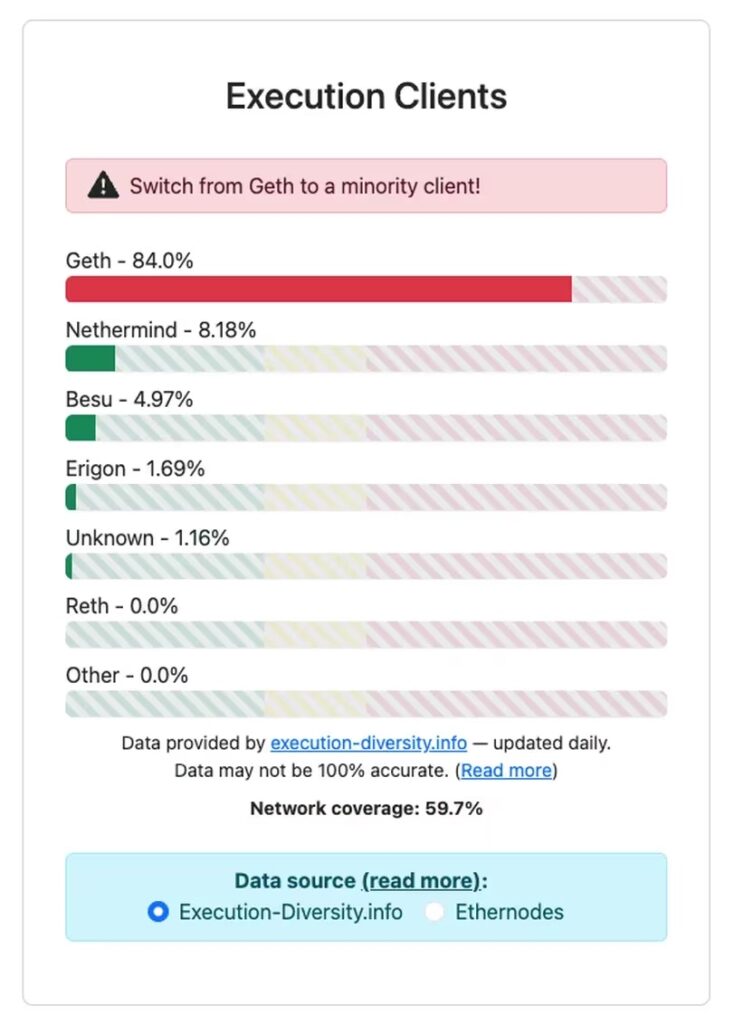
The Ethereum blockchain experienced a moment where something that didn’t go terribly wrong became a hot topic.
A bug in Ethereum’s client software Nethermind, used by blockchain validators to interact with the network, brought down most of the chain’s major operators on January 21st.
While a manageable incident, the incident reignited a long-running debate in the Ethereum ecosystem about the need for “client diversity.”
Some experts took the opportunity to point out how much worse the situation could have been if the Ethereum chain’s most popular execution client software, Geth, had been shut down.
Geth could become a single point of failure for the network, raising questions about Ethereum’s ability to continue.
Nethermind is used by about 8% of Ethereum validators, and the recent bug was severe enough to take many of these validators offline.
The Ethereum blockchain continued to operate despite the issue, and Nethermind developers released a patch within hours.
The main result of this bug was financial penalties imposed on some Nethermind-based validators, but this incident also affected the client software that powers about 5% of Ethereum validators. This follows a similar outage in early January that affected “Besu.”
Rekindling the debate
The series of failures has reignited a lively debate on X (formerly Twitter) over the Ethereum blockchain’s persistent issues with client software diversity. Networks that rely on a single client software are more vulnerable.
Approximately 85% of Ethereum’s validators currently use Geth, and recent failures with small execution clients indicate that Geth’s dominant position is There are renewed concerns that it could lead to serious consequences.
Geth stands for “Go Ethereum” and is primarily developed and maintained by the Ethereum Foundation, the main non-profit organization supporting the development of Ethereum.
Geth is not bug-free (as any software is), but it has never experienced the kind of catastrophic outages that hit Nethermind and Besu. If that were to happen, the impact would be far more severe for Ethereum.
Depending on the nature of the bug, a glitch in Geth could bring down the entire network, preventing validators from adding new blocks to the blockchain.
Ethereum is also programmed to penalize validators who go offline or break the network’s rules, so thousands of Geth-based validators face financial liability if a bug occurs. may be questioned. The penalties could be even greater if the bugs prove difficult to patch.
Notably, some of the major services that stake Ethereum on behalf of their users, effectively allowing many people to become validators effortlessly, rely on Geth.

 Geth is an overwhelmingly popular execution client on Ethereum (Clientdiversity.org)
Geth is an overwhelmingly popular execution client on Ethereum (Clientdiversity.org)Cygaar, which disseminates information on crypto assets (virtual currency), pointed out in a post by “Millions of Ethereum (ETH) held by validators could be destroyed.”
Citing data from the website execution-diversity.info, Cygaar further notes that major crypto exchanges such as Coinbase, Binance, and Kraken all offer staking services. Said it depends on Geth to run.
“Users staking on protocols running Geth stand to lose their Ethereum in the event of a significant issue.”
DCinvestor, a crypto investor with a large following on social media, posted on X that it would withdraw its staked assets from Coinbase until Coinbase switches its validator operations to a system that is less dependent on Geth clients.
“At this point, we cannot ignore the risks of what appears to be a single-client staking setup (reliant on Geth),” DCinvestor said, adding that if something goes wrong, “we could lose a significant portion of our deposited assets. No,” he continued.
Validator negligence
Daniel Hwang, a validator expert who heads the incubator Kintsugi Tech, said Ethereum clients’ interest in diversity is due to the Ethereum blockchain being held to higher standards than rival chains. This is also due to the fact that there are
“Almost every other chain doesn’t have the same diversity of client software as Ethereum,” Huang told CoinDesk in an interview.
“Most of them operate with just one client. I think the hurdles are probably high because Ethereum is the dominant smart contract chain.”
Although Geth boasts a high level of reliability, Huang said many Ethereum validators continue to use Geth by default (rather than alternatives like Nethermind) out of negligence.
In his experience, validators “don’t do their own research” on the strengths and weaknesses of competing client software.
The Ethereum Foundation is urging validators to improve client diversity, with one researcher, Dankrad Feist, saying that in 2022, validators will no longer use only the dominant client software. A blog that urged this was widely cited the other day. Nethermind’s development is supported by a grant from the Ethereum Foundation.
Huang likened Geth’s dominance despite the circumstances to an old business adage:
“No one buys IBM and gets fired.”
In other words, if everyone else is using Geth, it’s hard to criticize a budding validator for using it, even if something goes wrong.
However, Huang sees a silver lining in recent bugs in Nethermind and Besu.
“I don’t want to say it’s great that a client gets hit by a bug, but if it makes people think about responsibility, I think it’s great,” Huang said.
“Validators should have checked it themselves from the beginning, instead of just picking it off the supermarket shelf and raising their hands when something goes wrong.”
|Translation and editing: Akiko Yamaguchi, Takayuki Masuda
|Image: Shutterstock
|Original text: Bug That Took Down 8% of Ethereum’s Validators Sparks Worries About Even Bigger Outage
The post A bug that brought down 8% of validators – Ethereum, fears of large-scale failure and small hope | CoinDesk JAPAN appeared first on Our Bitcoin News.

 1 year ago
131
1 year ago
131














 English (US) ·
English (US) ·